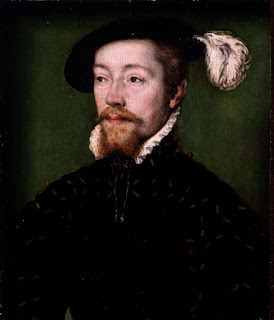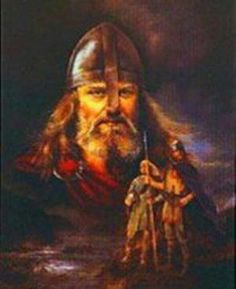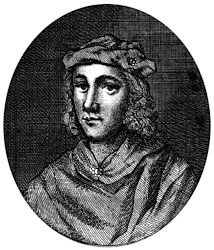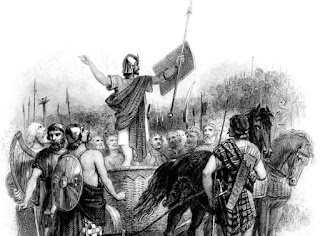King James V
James V., 1513-1542
The news of the defeat at Flodden spread grief and terror through the country. The citizens of Edinburgh built a wall round their city, but its strength was not tried, for the English army dispersed instead of advancing. The Estates met at Perth, and the Queen-mother was appointed Regent, for the King was an infant only two years old. But within a year the Queen married Archibald, the young Earl of Angus, and the Estates then transferred the regency to John, Duke of Albany, High Admiral of France, son of the brother of James the Third. Peace was made with England; Scotland being taken in as the ally of France in a treaty between that country and England.
Albany's government was at first very unpopular, for the national jealousy was roused by the number of his French followers. The Queen at first refused to give up the King, but she was besieged in Stirling Castle and obliged to yield. The country was distracted by the brawls of the two great factions, the Hamiltons and the Douglases. The Earl of Arran was the head of the former, Angus of the latter. The Governor put them down with the help of the French: Angus was seized and transported to France; his wife fled to England, where he contrived to join her before long. The Lord Home and his brother, two of the few survivors of Flodden, and the most powerful of the Angus faction, were seized at Edinburgh and beheaded, after [Pg 84]the mere form of a trial. But Albany went back to France after he had been about a year in Scotland; and as he left a Frenchman, Anthony de la Bastie, Warden of the Border, and placed the strongholds in the hands of the French also, the Scots grew more jealous and turbulent than before. De la Bastie fell a victim to the national hatred of foreigners. He was killed in a border raid by one of the Homes, in revenge for the death of his kinsman, the Lord Home. The Celts in the west re-asserted their independence, and the feud between the Hamiltons and the Douglases broke out worse than ever. They brought their brawls into the very streets of the capital. The Hamiltons laid a plan for attacking the Douglases, and making Angus prisoner. Gavin Douglas, Bishop of Dunkeld, fearing that his kinsmen might get the worst of it, appealed to James Beaton, the primate, to stop it. Beaton solemnly declared on his conscience that he knew nothing of the matter; and to give weight to his words, laid his hand on his heart, and in so doing struck the breastplate which he always wore. On this, Douglas, who heard the ring of the armour, told him that he heard his conscience "clattering," that is, telling tales. In the fight that followed, Angus so thoroughly routed his foes that the fray was called "Clear the Causeway," and after it he held the city with an armed force. Thus, five years passed, and the Regent, who had nominally gone back to France for a few months only, was still absent, and it took a great deal of urging and threatening from the Estates to bring him back to his trust.
It was now nine years since Flodden, and, as there had been peace with England during that time, the country had somewhat recovered her strength. When therefore Henry began to meddle in the affairs of Scotland, to require that Albany should be dismissed, and that the French connexion should be broken off, the Estates refused [Pg 85]and prepared for war. As the greater part of the English force was in France, the northern counties of England were comparatively unprotected, and it was just the time for striking an effective blow there. Instead of doing this, Albany came to terms with Lord Dacre, the English Warden, and the large army that had gathered round him melted away without doing anything. But the truce was not renewed. Dacre stormed Jedburgh, and the Scots mustered again. This time their numbers were increased by the presence of some French auxiliaries whom Albany had brought back from France, to which he had paid a second visit. Again, the army was brought to the Border without being led any further. By this time the Scots were thoroughly disgusted with Albany, and he with them; and shortly after this second fruitless expedition, he sailed for France and took the Frenchmen with him, 1524.
No sooner was Albany gone than Henry, through his subtle chancellor Wolsey, tried to make the Scots break with France. Margaret, the Queen-mother, was the great upholder of the English interest; James Beaton, Archbishop of St. Andrews and Chancellor, was the leader of the French party. Wolsey tried hard to get hold of Beaton on various pretexts, but Beaton was too cunning for him, and held himself apart in his own strong castle of St. Andrews, where he kept up dealings with France. But the English party were for a time the stronger, and, by the advice of Henry, James, who was now twelve years old, was set up to rule in his own name, and took his place at the head of the parliament, August 1524. The only change made by this step, called the erection, was that Albany's nominal government was done away with, and the French influence much weakened. Still Henry's interference was not liked, and the capture of Francis the First at Pavia turned the tide of popular feeling back to [Pg 86]the old allies of France. Since the erection, Arran had been the nominal head of the government, but in 1526 the King, who was now fourteen, was considered old enough to choose his own guardians. He chose the Earls of Errol, Argyle, and Angus, and an agreement was made that each in succession was to have the care of the King for three months. Angus's turn came first, but at the end of it he refused to give up his charge, and for two years he tyrannized over both the King and his subjects, and successfully resisted all attempts at a rescue.
James at last contrived to make his escape by riding in the night, disguised as a groom, from Falkland to Stirling Castle, 1528. Now that he was at last safely out of the hands of the Douglases, he set to work to crush them utterly. It was made treason for any who bore that name to come within six miles of the King, and an act of forfeiture was passed against them. Angus had many adherents; but as all those nobles who hoped for a share of his lands took part with the King, they proved too strong for him, and he was at last obliged to give in, and to flee for refuge to England. Thus the overthrow of the Red Douglases was as thorough as had been that of the elder branch, on whose ruin they had risen.
James began his reign by executing summary justice on the lawless and turbulent part of his subjects. The Borderers were now nearly as troublesome as the Highlanders. They dwelt in the debateable ground between England and Scotland and preyed on either country with the greatest impartiality. Certain families, as the Kerrs, Armstrongs, and Scotts, had a sort of monopoly of this wholesale thieving; and as they had taken to the clan system of the Celts, each robber chief in his peel tower could count, not only on the unquestioning service, but also on the personal devotion of every man in his following. John Armstrong [Pg 87]had made himself famous among them by his daring deeds. For this renown James made him pay dear; for judging that he, the most notorious offender, would make the most telling example of the force of justice, he had him seized and hanged like a common thief. New means were tried for quieting the disturbances in the Western Highlands and Isles. Argyle was deprived of his lieutenancy, and the government was in future to deal directly with the chiefs for the collection of taxes and of the feudal dues. Three persons were put to death in this reign for conspiracy and treason, all of whom were more or less connected with the banished Angus. These were the Lady Glammis, his sister; the Master of Forbes, his brother-in-law; and James Hamilton, the illegitimate brother of Arran, who was accused of being in league with him.
Though the need of a reform in the Church was felt and openly discussed in parliament, and the shortcomings of the clergy were unsparingly ridiculed by the popular poets, still neither the King nor the people were inclined to break off from Rome, as Henry the Eighth had done. But Henry was most anxious that his nephew should follow his example, and a meeting between them at York was agreed on. But James, doubtful of Henry's good faith, did not keep tryst. Henry was furious; he brought up again the old claim of supremacy over Scotland, and to enforce the claim he sent an army to invade Scotland. James prepared to avenge this attack; but when his army got as far as the Border, the nobles refused to go further, and a body of ten thousand men who had passed the Esk were surprised and scattered by Dacre, while they were contending about the chief command.
The King meanwhile was waiting in Caerlaverock Castle. At the same time that he heard of the shameful defeat of his army at Solway [Pg 88]Moss, the news was brought that a daughter was born to him. This child was heir to the throne, for his two sons had died in infancy. James thought that the birth of a girl at this time was an ill omen for Scotland. He murmured, "It came wi' a lass, and it'll gang wi' a lass." By this he meant that, as it was by Marjory Bruce that the crown had first passed into the Stewart family, so with this infant it would pass from it. Eight days later he died of grief and disappointment, December 14, 1542. James is the first King of Scots of whom we have a portrait. He was handsome, but had red hair, which won him the nickname of the "Red Tod," or red fox. He was not liked by the nobles, but the commons loved him well. His habit of going about in disguise familiarly among the people, endeared him to them, and led him into many amusing adventures. James was twice married, first to Magdalen, daughter of Francis the First, King of France; secondly, to Mary, daughter of the Duke of Guise, widow of the Duke of Longueville. In character and policy James was something like James the First. Like him, he strove to curb the power of the nobles, and to win for the Crown something more than mere nominal power, by making reforms which were much needed in the administration of justice. He worked out his ancestor's idea of a supreme court of justice by founding the Court of Session, or College of Justice. This court consisted first of thirteen, afterwards of fifteen, members, half of whom were clerks, and who acted both as judge and jury. As the members of this court were chosen from the parliament, it had the power of parliament, and was supreme in all civil cases, there being no appeal beyond it. James was not only a patron of letters, but himself a poet, one of the few royal poets whose writings will bear comparison with those of meaner birth. "Christ's Kirk on the Green," and the "Gaberlunzie Man," are the titles of two poems that are ascribed to him, but on no [Pg 89]very certain proof. They are both descriptions of scenes from peasant life. If indeed they were written by him, the choice of the subjects and the way in which they are treated show how well he knew the condition of his people. They, in loving remembrance of the favour he had always shown them, gave him the title of "King of the Commons, and the People's Poet."











Comments
Post a Comment